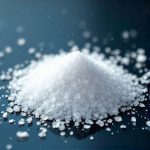Takeaways
- Chloride helps maintain fluid balance in the body
- Diarrhea causes loss of chloride and other electrolytes
- Replenishing chloride aids in relieving diarrhea symptoms
- Oral rehydration solutions effectively restore chloride levels
- Proper chloride intake supports digestive health
- Balanced electrolytes, including chloride, speed up recovery
Understanding Chloride
Chloride is a key electrolyte in the body, carrying a negative charge.[1] It works alongside other electrolytes to ensure proper bodily function. This mineral makes up a small part of your weight, about 0.15%, and is primarily found in blood and fluids outside of cells.[2]
Chloride is vital for maintaining the balance of fluids in the body.[3] It helps regulate how much water is inside and outside of cells.[4] This is important for staying hydrated and keeping cells working well. Chloride also helps to control the body’s pH levels.[5]
Chloride has several important jobs in the digestive system. It’s part of the stomach’s hydrochloric acid, which helps to break down food.[6] Chloride also helps the small intestine absorb nutrients.[7] It aids in moving water into the intestines, which supports regular bowel movements.[8]
Diarrhea: Causes and Effects
Diarrhea is when someone has loose, watery bowel movements more than three times a day.[9] It often comes with abdominal cramps, bloating, and a strong urge to go. Diarrhea can be uncomfortable and can cause dehydration if not treated.
Many things can cause diarrhea. Common causes include infections from viruses, bacteria, or parasites. Diarrhea can also be triggered by food issues like intolerances or allergies. Sometimes, medications or existing health conditions can also be the reason.
Diarrhea disrupts the body’s balance of electrolytes.[10] Frequent, watery stools cause the body to lose fluids and electrolytes, including chloride.[11] This imbalance can lead to dehydration and other problems if it’s not addressed quickly.
Types of Diarrhea
Acute diarrhea is the most common type, usually lasting just a few days.[12] It often resolves on its own and is usually caused by infections or dietary issues. Most people experience this type of diarrhea at some point.
Chronic diarrhea lasts for more than four weeks and may indicate a health problem, such as inflammatory bowel disease or celiac disease. It needs medical attention to find and treat the underlying cause.
Traveler’s diarrhea affects people who travel to areas with different hygiene standards. It’s often caused by contaminated food or water. It usually goes away within a few days but can be prevented by taking precautions.
Diarrhea can be categorized by how long it lasts and what causes it:
- Acute infectious diarrhea
- Food-related diarrhea
- Medication-induced diarrhea
- Chronic diarrhea from underlying conditions
Chloride Loss in Diarrhea
During diarrhea, the body loses a large amount of chloride.[13] Frequent, watery stools flush out electrolytes, including chloride, from the digestive system. This can happen quickly, especially if the diarrhea is severe.
A lack of chloride in the body can cause problems.[14] It can disrupt the balance of other electrolytes, affecting how the body functions. Low chloride levels can lead to weakness and fatigue, and in serious cases, more severe complications.[15]
| Electrolyte | Normal Levels | Levels During Diarrhea |
|---|---|---|
| Chloride | 96-106 mEq/L | Can drop below 90 mEq/L |
| Sodium | 135-145 mEq/L | Often decreases |
| Potassium | 3.5-5.0 mEq/L | Can be low or high |
Diarrhea affects other electrolytes besides chloride. Sodium and potassium levels can also become imbalanced.[16] These electrolytes work together, so a change in one can impact the others. Keeping all electrolyte levels balanced is important for recovery.
How Chloride Helps with Diarrhea
Chloride is important for reabsorbing fluids in the intestines.[17] It helps move water and other electrolytes back into the body.[18] This process is vital for staying hydrated and keeping electrolytes balanced when you have diarrhea.
In the gut, chloride helps maintain the correct pH balance in the intestines.[19] This balance is important for digestion and for the growth of good bacteria. Chloride also helps the body make digestive enzymes.[20]
When infections cause diarrhea, chloride helps the immune system.[21] It helps create a compound called hypochlorous acid, which immune cells use to fight germs.[22] Having enough chloride can help the body fight the cause of infectious diarrhea.
Chloride and Electrolyte Balance
Chloride helps restore the electrolyte balance disrupted by diarrhea.[23] It works with sodium to control fluid levels in the body.[24] When chloride levels are restored, it also helps bring other electrolytes back into balance.
The relationship between chloride and other electrolytes is complex. Chloride and bicarbonate often have an inverse relationship; if chloride levels increase, bicarbonate levels may decrease.[25] This interaction helps the body maintain the right acid-base balance.
Here’s how chloride helps with diarrhea relief:
- Replaces lost chloride in the body
- Aids in reabsorption of water in the intestines
- Helps restore balance of other electrolytes
- Supports proper pH levels in the gut
- Assists in immune function to fight infections
Sources of Chloride
Many foods contain chloride. The most common source is table salt, or sodium chloride.[26] However, it’s important to get chloride from different foods for overall health. Vegetables like seaweed and olives are good sources.[27]
Chloride is found in both plant-based and animal-based foods. Dairy products, eggs, and meat contain chloride.[28] Many vegetables like celery and tomatoes also provide this essential electrolyte.[29] Even some fruits, such as melons, have small amounts of chloride.
| Food | Chloride Content (mg per 100g) |
|---|---|
| Table salt | 60,900 |
| Seaweed (kelp) | 1,000 |
| Rye bread | 558 |
| Cheddar cheese | 621 |
| Tomato | 39 |
To get more chloride-rich foods, add a variety of vegetables to your meals, and include some dairy if you can tolerate it. Most people get enough chloride from a balanced diet. Try to focus on whole foods, rather than relying just on table salt.
Oral Rehydration Solutions
Oral rehydration solutions (ORS) are drinks specially formulated to replace fluids lost during diarrhea.[30] They have a good balance of electrolytes and glucose, making them a safe and effective way to prevent dehydration.[31]
ORS work by providing a good mix of sugar and electrolytes. This combination helps the body absorb water more efficiently. The glucose in ORS helps the small intestine absorb sodium and chloride.[32]
ORS come in different forms. Some are pre-mixed solutions that you can purchase. Others are powders that you mix with water. Homemade solutions can also work if made correctly. The World Health Organization (WHO) recommends ORS for managing diarrhea.[33]
A typical oral rehydration solution contains:
- Water
- Sodium chloride (table salt)
- Potassium chloride
- Glucose (sugar)
- Sodium citrate
Chloride Supplementation for Diarrhea
Chloride supplements come in different forms like tablets, powders, and liquids.[34] Most chloride supplements are combined with other electrolytes, especially sodium.[35] This combination helps to keep electrolytes properly balanced.
Chloride supplementation may be needed when you aren’t getting enough from your diet, such as during severe or prolonged diarrhea.[36] It can also be helpful for people who can’t take food or fluids by mouth. It’s best to consult a doctor before starting any supplements.[37]
The correct amount of chloride supplements depends on individual needs. Factors like age, weight, and how severe the diarrhea is will affect the dosage. Follow the instructions on the product label or your doctor’s advice. Take supplements with plenty of water to help absorption.
Potential Side Effects
Chloride supplements can cause side effects in some people, such as nausea, vomiting, or stomach discomfort.[38] In rare cases, more serious side effects, like an irregular heartbeat, can occur. If you experience severe symptoms, stop using the supplement and seek medical attention.
People with certain health issues should avoid taking too much chloride. Those with kidney problems or heart disease need to be careful.[39] People with high blood pressure should also monitor their chloride intake. Always consult a doctor before starting supplements.
Chloride supplements can interact with some medications. Diuretics, used for high blood pressure, can affect chloride levels.[40] Some antacids might also interact with chloride supplements. Tell your doctor about all the medications you’re taking.
Common side effects of chloride supplements include:
- Nausea
- Stomach discomfort
- Diarrhea (if taken in excess)
- Headache
- Swelling in hands or feet
Prevention and Management of Diarrhea
Preventing diarrhea starts with good hygiene. Wash your hands often, especially before eating and after using the restroom.[41] Make sure food is cooked and stored properly. When you travel, be careful about where your water and food come from.
Dietary changes can help prevent and manage diarrhea. When you have diarrhea, stick to foods that are easy to digest.[42] The BRAT diet (Bananas, Rice, Applesauce, Toast) can be helpful.[43] Gradually add other foods back as your symptoms improve.
Good hygiene is very important in preventing diarrheal infections. Use clean utensils and cutting boards when preparing food. If you’re in an area where the water quality is questionable, use bottled or boiled water. Teach children good hygiene habits to help prevent infections from spreading.
When to Seek Medical Help
There are signs that indicate you need to seek medical help for diarrhea. If diarrhea lasts more than a few days or if you have severe pain, seek help. High fever, bloody stools, or signs of dehydration also require medical attention.
Severe or prolonged diarrhea can lead to complications. Dehydration is the most common risk, and it can be dangerous, especially for young children and older adults.[44] Electrolyte imbalances can affect the heart and muscles. In rare cases, chronic diarrhea can lead to malnutrition.
Doctors use different tests to find the cause of diarrhea. These might include stool samples to check for infections.[45] Blood tests can assess electrolyte levels and overall health.[46] In some cases, imaging tests or an endoscopy may be needed to rule out other conditions.
Warning signs that require immediate medical attention include:
- Severe abdominal or rectal pain
- Blood in the stool
- Black, tarry stools
- Signs of dehydration (extreme thirst, dry mouth, little or no urine)
- Fever above 102°F (39°C)
Chloride in Special Populations
Infants and children with diarrhea need extra care. They are more likely to get dehydrated due to their smaller body size.[47] ORS designed for children are often recommended. In severe cases, they may need to be hospitalized for intravenous fluid replacement.
Pregnant women with diarrhea need to be careful. Dehydration can be harmful to both the mother and baby.[48] Electrolyte balance, including chloride, is very important during pregnancy. Talk to a doctor for safe ways to manage diarrhea during pregnancy.
Older adults may have different needs for chloride when they have diarrhea. Changes in kidney function due to age can affect electrolyte balance.[49] Older adults may also have other health conditions that make managing diarrhea more complicated. Careful monitoring and treatment are important.
Athletes and Chloride Loss
Athletes lose chloride through sweat during intense physical activity.[50] This loss can be significant, especially in hot weather or during long periods of exercise. Athletes need to be aware of their electrolyte balance, including their chloride levels.
For athletes who have diarrhea, replenishing chloride is especially important.[51] The combined loss from sweating and diarrhea can quickly lead to imbalances. Proper hydration with electrolyte-rich fluids is vital for maintaining performance and health.
To maintain chloride balance, athletes can use different strategies. Drinking electrolyte-rich sports drinks during and after exercise helps. Eating a balanced diet with chloride-rich foods is also important. In some cases, electrolyte supplements may be needed.
The chloride content of sports drinks:
- Gatorade
- Powerade
- Coconut water
- Homemade electrolyte drinks
FAQs: People Also Ask
People often have questions about diarrhea and electrolyte balance. This section addresses common concerns about chloride and how to manage diarrhea. Understanding these issues can help you better handle diarrhea and keep your electrolyte levels balanced.
These questions reflect common worries and misunderstandings about diarrhea and electrolyte balance. By addressing them, the goal is to provide clear and useful information. Keep in mind that while this information is general, individual cases may vary.
How long does diarrhea typically last?
Can you have too much chloride in your body?
What are the symptoms of low chloride levels?
How quickly do oral rehydration solutions work?
Is it safe to exercise when you have diarrhea?
Can certain foods help replenish chloride during diarrhea?
Conclusion
Chloride is essential for managing diarrhea. This electrolyte helps keep fluids balanced in the body, which is often disrupted during diarrhea. By understanding how chloride functions, you can better manage diarrhea symptoms and prevent complications.
Staying hydrated and keeping electrolytes balanced are key during diarrhea. Oral rehydration solutions are effective at replacing lost fluids and electrolytes, including chloride. These solutions, along with a balanced diet, can help you recover faster and prevent dehydration.
Adding chloride-rich foods and ORS to your diarrhea management plan can make a big difference. Remember to pay attention to your body and seek medical help when needed. With the proper care and attention to your electrolyte balance, you can manage most cases of diarrhea effectively at home.
Chloride is indeed an essential electrolyte, and its ionic form (Cl-) carries a negative charge, making it an anion.
Source: “Phenylacetonitrile (C6H5CH2CN) Ionic Liquid Blends as Alternative Electrolytes for Safe and High-Performance Supercapacitors” https://www.ncbi.nlm.nih.gov/pmc/articles/PMC7321299/
Chloride is present in the body and is most abundant in extracellular fluids like blood plasma and interstitial fluid. The 0.15% weight percentage can vary, but it is indeed a relatively small component.
Source: “Phenylacetonitrile (C6H5CH2CN) Ionic Liquid Blends as Alternative Electrolytes for Safe and High-Performance Supercapacitors” https://www.ncbi.nlm.nih.gov/pmc/articles/PMC7321299/
Chloride, along with other electrolytes, helps regulate osmotic pressure, which is vital for maintaining the correct fluid balance within and around cells.
Source: “Chloride transport modulators as drug candidates” https://www.ncbi.nlm.nih.gov/pmc/articles/PMC8714991/
Chloride ions contribute to osmotic pressure, which helps dictate the movement of water across cell membranes.
Source: “Chloride transport modulators as drug candidates” https://www.ncbi.nlm.nih.gov/pmc/articles/PMC8714991/
Chloride is involved in maintaining the body’s acid-base balance, especially in the kidneys and blood.
Source: “Phenylacetonitrile (C6H5CH2CN) Ionic Liquid Blends as Alternative Electrolytes for Safe and High-Performance Supercapacitors” https://www.ncbi.nlm.nih.gov/pmc/articles/PMC7321299/
Chloride is a key component of hydrochloric acid (HCl) in the stomach, which is essential for digestion.
Source: “Chloride transport modulators as drug candidates” https://www.ncbi.nlm.nih.gov/pmc/articles/PMC8714991/
Chloride plays a role in the absorption of nutrients, particularly through its involvement in various transport mechanisms in the small intestine.
Source: “Chloride transport modulators as drug candidates” https://www.ncbi.nlm.nih.gov/pmc/articles/PMC8714991/
Chloride helps maintain osmotic gradients that draw water into the intestinal lumen, which is crucial for regular bowel movements.
Source: “Chloride transport modulators as drug candidates” https://www.ncbi.nlm.nih.gov/pmc/articles/PMC8714991/
Diarrhea is characterized by increased frequency of bowel movements, which are typically loose and watery, usually more than three times a day.
Source: “Abstracts from the 2023 Annual Meeting of the Society of General Internal Medicine” https://www.ncbi.nlm.nih.gov/pmc/articles/PMC10323075/
Frequent, watery stools cause loss of fluids and electrolytes, including chloride, sodium, and potassium, leading to imbalances.
Source: “Abstracts from the 2023 Annual Meeting of the Society of General Internal Medicine” https://www.ncbi.nlm.nih.gov/pmc/articles/PMC10323075/
During diarrhea, significant amounts of fluids and electrolytes, including chloride, are lost through the stool, potentially causing dehydration and imbalances.
Source: “Abstracts from the 2023 Annual Meeting of the Society of General Internal Medicine” https://www.ncbi.nlm.nih.gov/pmc/articles/PMC10323075/
Acute diarrhea is indeed more common and is usually self-limiting, resolving within a few days.
Source: “Abstracts from the 2023 Annual Meeting of the Society of General Internal Medicine” https://www.ncbi.nlm.nih.gov/pmc/articles/PMC10323075/
Diarrhea often causes substantial loss of chloride through watery stools, which can result in imbalances if not corrected.
Source: “Abstracts from the 2023 Annual Meeting of the Society of General Internal Medicine” https://www.ncbi.nlm.nih.gov/pmc/articles/PMC10323075/
Hypochloremia, a condition of low chloride levels, can indeed lead to various health issues, including acid-base imbalance, weakness, and fatigue.
Source: “Phenylacetonitrile (C6H5CH2CN) Ionic Liquid Blends as Alternative Electrolytes for Safe and High-Performance Supercapacitors” https://www.ncbi.nlm.nih.gov/pmc/articles/PMC7321299/
Hypochloremia is associated with weakness, fatigue, and if severe, can lead to more serious complications such as irregular heartbeat and muscle spasms.
Source: “Phenylacetonitrile (C6H5CH2CN) Ionic Liquid Blends as Alternative Electrolytes for Safe and High-Performance Supercapacitors” https://www.ncbi.nlm.nih.gov/pmc/articles/PMC7321299/
Besides chloride, diarrhea also leads to the loss of sodium and potassium, leading to electrolyte imbalance.
Source: “Abstracts from the 2023 Annual Meeting of the Society of General Internal Medicine” https://www.ncbi.nlm.nih.gov/pmc/articles/PMC10323075/
Chloride helps in the movement of water back into the body from the intestines.
Source: “Chloride transport modulators as drug candidates” https://www.ncbi.nlm.nih.gov/pmc/articles/PMC8714991/
Chloride facilitates the movement of water and other essential electrolytes from the intestines back into the bloodstream, helping to prevent dehydration.
Source: “Chloride transport modulators as drug candidates” https://www.ncbi.nlm.nih.gov/pmc/articles/PMC8714991/
Chloride ions are involved in maintaining the correct pH balance in the intestines.
Source: “Chloride transport modulators as drug candidates” https://www.ncbi.nlm.nih.gov/pmc/articles/PMC8714991/
Chloride contributes to the production of digestive enzymes that are needed for breaking down food.
Source: “Chloride transport modulators as drug candidates” https://www.ncbi.nlm.nih.gov/pmc/articles/PMC8714991/
Chloride is involved in the production of hypochlorous acid, a substance used by immune cells to fight off pathogens.
Source: “Chloride transport modulators as drug candidates” https://www.ncbi.nlm.nih.gov/pmc/articles/PMC8714991/
Chloride is a crucial component in the production of hypochlorous acid (HOCl) by immune cells. HOCl is used to kill pathogens.
Source: “Chloride transport modulators as drug candidates” https://www.ncbi.nlm.nih.gov/pmc/articles/PMC8714991/
Chloride plays an important role in reestablishing electrolyte balance that is disrupted during diarrhea.
Source: “Phenylacetonitrile (C6H5CH2CN) Ionic Liquid Blends as Alternative Electrolytes for Safe and High-Performance Supercapacitors” https://www.ncbi.nlm.nih.gov/pmc/articles/PMC7321299/
Chloride often works in conjunction with sodium to control fluid levels in the body through osmotic regulation.
Source: “Phenylacetonitrile (C6H5CH2CN) Ionic Liquid Blends as Alternative Electrolytes for Safe and High-Performance Supercapacitors” https://www.ncbi.nlm.nih.gov/pmc/articles/PMC7321299/
The body often uses an exchange mechanism between chloride and bicarbonate to help maintain acid-base balance. When chloride levels increase, bicarbonate levels may decrease.
Source: “Phenylacetonitrile (C6H5CH2CN) Ionic Liquid Blends as Alternative Electrolytes for Safe and High-Performance Supercapacitors” https://www.ncbi.nlm.nih.gov/pmc/articles/PMC7321299/
Sodium chloride (table salt) is indeed a major source of chloride intake in the diet.
Source: “Phenylacetonitrile (C6H5CH2CN) Ionic Liquid Blends as Alternative Electrolytes for Safe and High-Performance Supercapacitors” https://www.ncbi.nlm.nih.gov/pmc/articles/PMC7321299/
Certain vegetables like seaweed and olives contain chloride and contribute to overall dietary intake.
These foods contain chloride, which is essential for various bodily functions.
Celery and tomatoes are among the vegetables that offer some amounts of chloride.
Oral rehydration solutions (ORS) are specially formulated to help replenish fluids and electrolytes lost during diarrhea.
Source: “Abstracts from the 2023 Annual Meeting of the Society of General Internal Medicine” https://www.ncbi.nlm.nih.gov/pmc/articles/PMC10323075/
ORS usually contain a specific balance of electrolytes, such as sodium, potassium, and chloride, along with glucose to enhance water and electrolyte absorption in the small intestine.
Source: “Abstracts from the 2023 Annual Meeting of the Society of General Internal Medicine” https://www.ncbi.nlm.nih.gov/pmc/articles/PMC10323075/
The presence of glucose in ORS enables the sodium-glucose cotransporter to facilitate the uptake of sodium, which then draws in chloride and water.
Source: “Abstracts from the 2023 Annual Meeting of the Society of General Internal Medicine” https://www.ncbi.nlm.nih.gov/pmc/articles/PMC10323075/
The World Health Organization (WHO) strongly recommends the use of oral rehydration solutions (ORS) for managing diarrhea to prevent dehydration.
Source: “Abstracts from the 2023 Annual Meeting of the Society of General Internal Medicine” https://www.ncbi.nlm.nih.gov/pmc/articles/PMC10323075/
Chloride supplements, often formulated alongside other electrolytes, are available as tablets, powders, and liquid solutions.
Chloride supplements are often combined with other electrolytes, most often sodium, to help maintain the appropriate balance.
Chloride supplementation is sometimes necessary when chloride levels are low, as can occur during conditions that lead to losses, like prolonged diarrhea.
It is important to consult with a healthcare provider before beginning any supplement regimen in order to make sure that it is appropriate for your health condition.
Chloride supplementation, like many other supplements, can lead to gastrointestinal discomfort, such as nausea, vomiting, or upset stomach.
Patients with kidney problems or heart disease need to be careful with chloride supplementation as they may have difficulty processing excess electrolytes.
Certain medications, like diuretics, can affect electrolyte levels, including chloride, and can interact with chloride supplementation.
Washing hands regularly, particularly before meals and after using the bathroom, is a key preventative measure against diarrheal infections.
Source: “Abstracts from the 2023 Annual Meeting of the Society of General Internal Medicine” https://www.ncbi.nlm.nih.gov/pmc/articles/PMC10323075/
During diarrhea, it is recommended to eat foods that are easy to digest to reduce strain on the digestive system.
The BRAT diet, which consists of bananas, rice, applesauce, and toast, is a bland and easy to digest diet that is sometimes recommended when dealing with diarrhea.
Dehydration is a significant risk during severe or prolonged diarrhea and is especially dangerous for young children and older adults due to their susceptibility.
Source: “Abstracts from the 2023 Annual Meeting of the Society of General Internal Medicine” https://www.ncbi.nlm.nih.gov/pmc/articles/PMC10323075/
Diagnostic tests for diarrhea often include stool samples to check for infections, blood tests to evaluate electrolyte levels, and imaging tests in some cases.
Blood tests can help assess electrolyte levels, hydration status, and overall health when someone has diarrhea.
Infants and children are at greater risk of dehydration during diarrhea because they have smaller bodies and higher metabolic rates.
Source: “Abstracts from the 2023 Annual Meeting of the Society of General Internal Medicine” https://www.ncbi.nlm.nih.gov/pmc/articles/PMC10323075/
Pregnant women need to be particularly cautious about diarrhea as it can cause dehydration, which is harmful to both mother and fetus.
Older adults can have unique needs for electrolyte management during diarrhea due to kidney changes, which can affect their ability to regulate chloride and other electrolytes.
Athletes can lose significant amounts of chloride, along with other electrolytes, through sweat during exercise, particularly in hot environments.
When athletes have diarrhea, the combined electrolyte loss from sweat and diarrhea makes it even more important to replenish electrolytes, including chloride, promptly.



